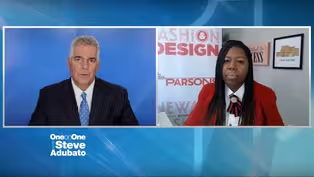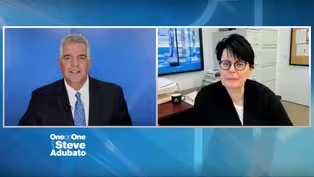One-on-One
COVID's Mental Impact on Parents and Their Children
Clip: Season 2023 Episode 2607 | 9m 10sVideo has Closed Captions
COVID's Mental Impact on Parents and Their Children
Graduate Program Director and Professor of Psychology at Rutgers University-Newark, Vanessa LoBue, Ph.D., joins Steve Adubato for a conversation about how COVID-19 impacts the mental health of parents and their children.
Problems playing video? | Closed Captioning Feedback
Problems playing video? | Closed Captioning Feedback
One-on-One is a local public television program presented by NJ PBS
One-on-One
COVID's Mental Impact on Parents and Their Children
Clip: Season 2023 Episode 2607 | 9m 10sVideo has Closed Captions
Graduate Program Director and Professor of Psychology at Rutgers University-Newark, Vanessa LoBue, Ph.D., joins Steve Adubato for a conversation about how COVID-19 impacts the mental health of parents and their children.
Problems playing video? | Closed Captioning Feedback
How to Watch One-on-One
One-on-One is available to stream on pbs.org and the free PBS App, available on iPhone, Apple TV, Android TV, Android smartphones, Amazon Fire TV, Amazon Fire Tablet, Roku, Samsung Smart TV, and Vizio.
Providing Support for PBS.org
Learn Moreabout PBS online sponsorship(upbeat music) - Hi everyone.
Steve Adubato here.
For the first time we are honored to introduce Dr. Vanessa LoBue, who is Graduate Program Director and Professor of Psychology at Rutgers University.
Good to see you, professor.
- Thanks for having me.
- We are taping on Valentine's Day.
No particular significance to that but I'm curious about this.
Your research focuses heavily on the emotional development of children, particularly around the impact three years plus into COVID.
The most significant findings are?
- Well, the most significant findings are that babies seem to be okay.
They seem to be functioning normally.
They seem to be being, they can recognize that people wearing masks are people, they can remember people who are wearing masks.
The real impact seems to be on parents.
- On parents?
- Yeah.
- Be more specific.
How are we-- - Well-- - Dealing with this?
- Well, I guess the answer is that we're not, or you know some parents are just feeling really anxious and depressed and stressed from the pandemic, which is really understandable.
But the real issue with that is that parents' mental health trickles down and affects children's mental health.
In fact, the biggest predictor of anxiety in children is anxiety in their parents.
- Let's play this out for a little bit.
All of us who are parents have experienced all kinds of emotions, feelings, and still do, not just related to COVID, just the world we're living in.
And so here's the thing I keep thinking about.
Is it our job as parents to keep from our children the anxiety, the depression, the feelings, the emotions, and the crap we're dealing with?
Is it our job?
Hey, just keep it away from the kids.
- I wouldn't say that that's our job but I think that being a parent can be, I'm a parent of two.
I have a five-year-old and an eight-year-old.
They were at home for a big part of the pandemic.
And I don't think keeping our stress away from them is necessarily the answer.
I think the answer is that we have to remember to take care of ourselves sometimes too.
So it's not that we should hide it from them, it's that we should remember that our own mental health matters.
Oftentimes we try to shield our kids from everything.
I mean, that's the instinct, right?
Shield them from our anxiety and our depression.
But I think the better response is to, you know, take care of our own mental health too, when we can.
- Let's be more specific.
So I'm heavily into "wellness," and on a sister program called Lessons and Leadership.
I do with my colleague Mary Gamba.
We talk a lot about the connection between wellness and leadership, wellness and functioning in our professional lives.
But I can't count the number of people that I've coached in that work as leadership coach.
I don't have time for this wellness thing.
I have things to do, do you have any idea what my schedule is?
Do you know what time I'd have to get up to take a walk?
Talk to those folks.
- Well, that's the very issue.
It's that our own mental health, our own wellness, our own wellbeing tends to take a backseat.
And, you know, this is true for kids, for people who have kids and people who don't have kids, right?
Like, work comes first.
All of these other issues come first.
And when you're a parent, it's like the kids obviously come first but I don't think what parents realize is that our own mental health affects them in a lot of ways that we can't control.
So we can try to shield them all we want from our own mental health issues.
Maybe you don't want your kids to see you upset but they do see it.
They notice.
And I think that we, our own emotionality shapes theirs in ways that we're not even aware of.
You know how anxious moms may be less responsive to their kids or they might be a little too responsive to their kids, you know, for the helicopter kind of parents out there.
So I think that what I'm saying is that this is an excuse to take care of yourself, right?
So taking care of yourself is actually good for your kids.
- What do they say on the airplane?
Put on your-- - Put on your mask first.
Your own mask first.
- Put on your mask first.
That is a metaphor for obviously the rest of our lives.
Shift gears if we could.
This is by the way, Dr. Vanessa LoBue, who is professor of psychology at Rutgers University, director of the graduate program there, professor talk about the learning loss of our children three years plus into COVID.
Where is it most prevalent and what do we need to do?
- That is a really great question.
So a month or two ago, the New York Times, I believe, put out this article showing this real dip in standardized test scores for kids this year after the COVID-19 pandemic.
And the headline was something about like biggest drop in 20 years or something like that.
And it is true, there was a drop in standardized test scores this year which makes a lot of sense.
But what I would say is looking at the actual data from recent standardized test scores, it-- - One second.
Sorry for interrupting.
Doctor, our team is telling us this data comes from the National Assessment of Educational Progress and team in post-production, if we could put up that website so people can find out more.
I'm sorry, Vanessa, please pick up.
- That's okay.
What I was saying was that there was a dip, but in general, if you look at the trends over the last 20, 30 years, we're doing okay.
And if you actually look at the data, it's not every child that has experienced this drop in test scores.
It seems to be the kids who were already struggling and the kids who didn't have the resources they needed during the COVID pandemic.
So I would say that the take home from this isn't that our kids are doomed.
We've been through a lot, you know, all kids go through something.
So kids after 9/11 were different than kids before 9/11.
You know, we go through these, kids before Katrina were different from kids after Katrina who experienced this.
I don't think all is lost.
But I think the thing to learn here is that the kids who suffered the most were the kids who were behind anyway.
So what the pandemic has done is it's increasing the gap that already exists.
- You know, my colleague Jacqui Tricarico, who is the executive producer of Think Tank and one of our correspondent, we went down to Atlantic City for the teacher's convention and we spoke extensively with educational leaders about supporting our teachers.
There is a shortage, I'm not gonna get into the policy questions, which we're doing with legislators on the federal and the state level and local level as to what can be done should be done.
The impact, the emotional, psychological impact on our teachers who are so incredibly important in being there for our kids.
Please, got a minute left.
- I mean, there's a huge impact on our teachers and teachers were sort of thrown in the middle of a political crossfire here where-- - Not what they signed up for.
- It's not what they signed up for.
And they're doing their best.
And many of them went back before the rest of us went back.
My husband is a middle school math teacher, September, 2020, he was back in the classroom while most of us were at home.
So I think remembering that the teachers wanna be safe but they also wanna teach our kids and they deserve our support.
We should give them as much support as possible.
The kids who are doing well are the kids who got support and resources during the pandemic.
And the kids who didn't do well are the kids who felt that they didn't have the resources that they needed.
So the thing to remember is everybody wants the same thing.
You know, everybody wants our kids to be doing well, our teachers to be doing well.
So remembering that their stressed too, and they have families at home, and that we should support them through these difficult times is important.
- Well said.
This is Dr. Vanessa LoBue, Graduate Program Director and Professor of Psychology at the Rutgers University, our state university.
Professor, thank you so much for joining us.
We appreciate it.
- Thanks so much, Steve.
- You got it.
Stay with us.
We'll be right back.
- [Narrator] One-On-One with Steve Adubato has been a production of the Caucus Educational Corporation.
Funding has been provided by The Turrell Fund, supporting Reimagine Childcare.
NJM Insurance Group.
PNC, Grow Up Great.
PSEG Foundation.
PSE&G, New Jersey Sharing Network.
The North Ward Center.
The Port Authority of New York and New Jersey.
And by Community FoodBank of New Jersey.
Promotional support provided by NJBIZ.
And by New Jersey Globe.
How do you create change?
By cultivating hope.
And we see that every day, in the eyes of our preschoolers, in the souls of the seniors in our adult day program, in the minds of the students at Robert Treat Academy, a national blue ribbon school of excellence, in the passion of children in our youth leadership development program, in our commitment to connections at the Center for Autism, and in the heart of our community, the North Ward Center,
Creating Inclusive Fashion With a Purpose
Video has Closed Captions
Clip: S2023 Ep2607 | 11m 10s | Creating Inclusive Fashion With a Purpose (11m 10s)
NJ Museum's Connection to our Past, Present, and Future
Video has Closed Captions
Clip: S2023 Ep2607 | 8m 10s | NJ Museum's Connection to our Past, Present, and Future (8m 10s)
Providing Support for PBS.org
Learn Moreabout PBS online sponsorship
- News and Public Affairs

Top journalists deliver compelling original analysis of the hour's headlines.

- News and Public Affairs

FRONTLINE is investigative journalism that questions, explains and changes our world.












Support for PBS provided by:
One-on-One is a local public television program presented by NJ PBS

